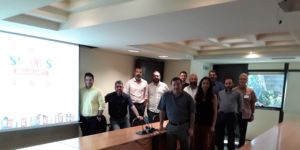
As part of SMUBS engagement with the EO industry, a local workshop on Athens was organized on 18 September 2018, as a back-to-back meeting during the kick-off of the national funded project EMISSION. Views were exchanged on the current capacities/activities of the private sector, in the domain of EO, smart cities and air quality. In particular, the state-of-the-art mid- low-cost sensors for AQ measurements were the central topic of discussion among 5 representatives from companies and 6 from the research community.

Sensors should be able to monitor the conventional gaseous pollutants (O3, NOx, CO) as well as ΡΜ1/PM2.5/PM10/BC(black carbon), according to EC standards. In parallel, the basic meteorological parameters (T, RH, P) should be also measured using sensors

QA/QC procedures for the sensors can be facilitated through a prototype method supported by a super-site (conventional, high-quality) in situ sensors

A supporting software system is necessary for the calculation –among others- of a complex air quality index, to be used as the main visualization product of the solution

Technical issues and requirements to be considered: Choice of the hosting IoT platform, data transmission options, sampling mode options, time distance between measurement and transmission, power and energy supplies, installation manners, portability of the sensors, interconnection among sensors, data logger and platform

A scientific approach should be employed to indicate the positioning of the monitoring sites of an AQ city network, incorporating the needs of the regional/local authorities and the research communities and criteria of sampling representativeness and adequacy
 As part of SMUBS engagement with the EO industry, local meetings/workshops are organized to exchange views on the current capacities/activities of the private sector, in the domain of EO and smart cities and within the fields covered by the project.
As part of SMUBS engagement with the EO industry, local meetings/workshops are organized to exchange views on the current capacities/activities of the private sector, in the domain of EO and smart cities and within the fields covered by the project.
The first event was organized in Athens, on 18 September 2018, as a back-to-back meeting during the kick-off of the national funded project EMISSION. The technological solutions promoted by EMISSION (consortium comprised mainly of SMEs) in the field of air quality and their relevance to SMURBS implementation were thoroughly discussed. Collaboration options and multi-level links and complementary activities were inquired and most importantly interoperability aspects were set on the table to enable and facilitate use of common standards (i.e. infrastructure, platforms, telecommunication, indicators) and future merging of capacities and outcomes.

